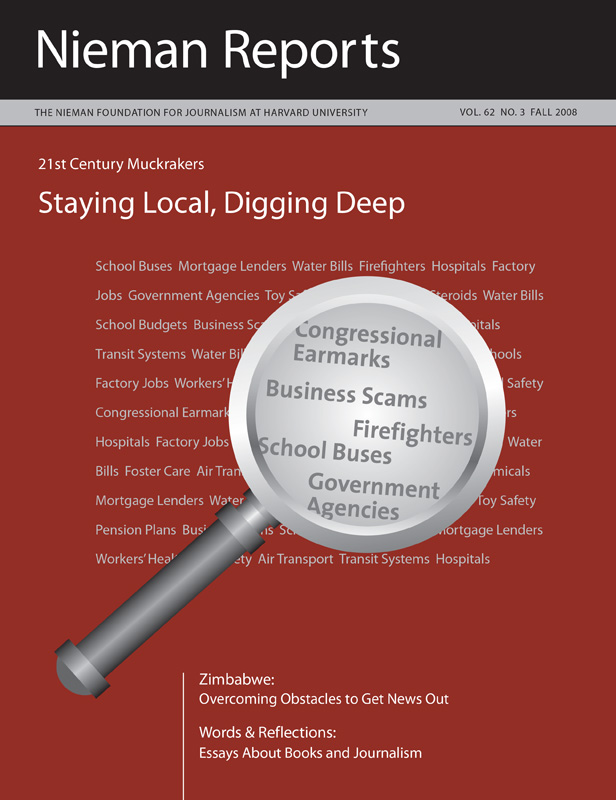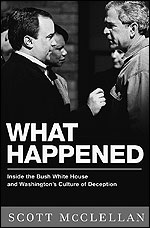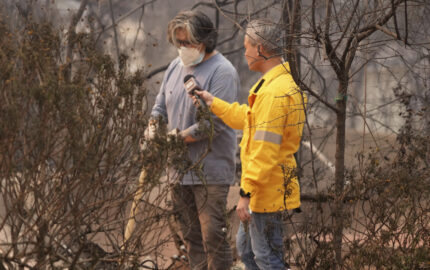
21st Century Muckrakers: Staying Local, Digging Deep
On this point, editors, reporters and newspaper readers agree. In a time of cutbacks and a shrinking news hole, at a moment when print is in peril and digital is dominant, watchdog and investigative reporting must remain at the core of journalism’s mission. In this third part of our 21st Century Muckrakers project, editors and reporters speak to how metro and regional newspapers are confronting the enormous challenges of today and offer clues to where this kind of reporting will likely be headed tomorrow.
Just after lunch on February 1, 2007, a jury in a federal courthouse a block from the U.S. Capitol sat, utterly rapt, watching a few moments of old videotape. The trial, the first I had covered in more than two decades, was the celebrated case against I. Lewis “Scooter” Libby, Vice President Cheney’s former chief of staff. Libby was on trial for lying to investigators about whether he had slipped to reporters the identity of a covert CIA officer whose husband was an early critic of the Iraq War.
The brief video clips that captivated the jurors showed President Bush’s press secretary in the early fall of 2003, Scott McClellan, at the familiar podium in the White House briefing room. On the tape, McClellan was insisting that Libby and two other senior members of the administration had not leaked information about the officer, Valerie Plame. “I spoke with them, so that I could come back to you and say that they were not involved,” McClellan assured the White House press corps.
Prosecutors had fought hard to play the videotape during the trial, telling the judge that the press secretary’s assurances undercut Libby’s defense that he had been scapegoated by the White House—and heightened Libby’s motive to lie about his role in the leak when he would be interviewed by FBI agents investigating it soon afterwards.
In the end, the jury believed neither McClellan nor Libby, convicting the vice president’s longtime right-hand man of perjury and obstructing justice.
Now, two years after he stepped down from the podium for the final time, it turns out that McClellan is the one who believes he was scapegoated by the White House. “I threw myself in front of the bus,” is the way he describes it. He says he was “knowingly misled” and ordered to tell an unwitting falsehood in order to protect three of the President’s men.
His complicity in the White House’s deceptions about Libby is a central, gnawing episode in a progressive disillusionment—with Washington and with a President in whom he believed—that McClellan traces in his book, “What Happened: Inside the Bush White House and Washington’s Culture of Deception.” McClellan’s main argument is that the Bush White House, like several before it, fell captive to a “permanent campaign” mentality in which political marketing—whether of the Iraq War, Social Security or, in this instance, the reputations of top aides—became paramount, even if it eclipsed the truth.
A Revisionist Appraisal
It is an unlikely critique, coming from McClellan, who gravitated to Bush as a young politico, followed him from Texas into the White House, and spent a half-dozen years articulating the President’s message. Predictably, when “What Happened” was published in the spring, McClellan’s revisionist appraisal was condemned by several of his former colleagues. But as I pored through the pages over the summer, many of its basic themes rang true, from my experiences with the Bush White House and with Scott himself.
I covered the White House for three and a half years of George W. Bush’s first term until I decamped to Cambridge for a year, in part because I wanted to gain perspective, away for a time from the venomous political climate in Washington that McClellan describes. During those years, my focus was writing about domestic policy issues. Given the way issues were divided among the press office staff, I interacted with Scott, while he was the chief deputy, more frequently than with Ari Fleischer, Bush’s first press secretary, or with the office’s other deputy.
McClellan, I found, was guarded and faithful to the White House’s party line, but usually honest. I know of at least one occasion on which he was a source of information for one of my colleagues, then turned around and berated this reporter, publicly insisting that the story he personally had leaked was untrue. But I do not recall any such episodes firsthand. If McClellan was spinning me, he usually would acknowledge it. If he was not allowed to answer a question, he would tell me that, rather than lie.
Once he took over as press secretary during the summer of 2003—just a few months before he would erroneously vouch for Libby—he sometimes seemed more stilted, awkward. It is hard to know whether this lack of grace at the briefing room podium was because he was, as he now suggests, trying to reconcile his talking points with his conscience. Or perhaps he simply was less agile in that more public spot.
It is hard to know, too, what to make of his revisionism. Is he sincerely remorseful, now that he has reflected on his time in the White House? “… we perpetuated the endless investigations and scandals we’d vowed to move beyond,” he writes, “by engaging in spin, stonewalling, hedging, evasion, denial, noncommunication, and deceit by omission.” Is he bitter? (“I sacrificed my own credibility,” he writes, “for the sake of the administration.”) Or is he, as his critics contend, cashing in or trying to advance his career prospects by distancing himself from a President who has become extraordinarily unpopular?
In a sense, though, McClellan’s motivation for what he has written is beside the point. “What Happened” describes a corrosive style of behaving with the press, the public, and the opposing political party that was familiar to me and to any other reporter who has covered the White House during this administration, “… a truth-deficient culture,” as McClellan describes Washington in one of his book’s more memorable phrases.
He raises the issue, debated widely ever since the Iraq War began, of whether the press was, as he contends, “too deferential.” Even this issue, significant as it is, is not the heart of the matter. Reporters’ questions, no matter how incisive, cannot compel a White House to provide answers—or honest ones.
Journalistic Coping Methods
For me, the essential thing is this: If reporters entrusted to cover the White House know we are in the midst of a “truth-deficient” environment, what is the most responsible way to do our work? As my editors knew well, it is a question that nagged at me throughout my time covering the Bush White House. It influenced my reporting methods and the stories I chose to write.
Confronted with the “hedging, evasion, denial, noncommunication” that McClellan has now confessed, I learned to report indirectly, from the outside in. It was a curious aspect of my beat that, although I was assigned to cover the White House, some days I did not speak with anyone there until late afternoon or early evening. It was more productive, I discovered, to spend the day pursuing other sources, often in Congress or among interest groups aligned with or in opposition to the administration—anyone who had a strong self-interest in ferreting out what was going on inside. The insights I gained in this way gave me leverage, once I finally called McClellan or someone else in the White House, to confront them with what I already knew. It was not a perfect reporting strategy. Sometimes, officials yelled at me—or, on occasion, my editor—that we would publish a story at our peril, refusing to confirm what we knew to be true. Yet, it enabled me to break stories before the White House wanted them out—to pierce, in other words, the infamous Bush “message discipline.”
In the administration’s early weeks, this indirect reporting method enabled me to write that Bush was about to abandon a half-century tradition in which Presidents had relied on the American Bar Association for advice about the qualifications of potential federal judges—a move that foreshadowed years of ideological disputes over the administration’s judicial nominations. Later on, I was able to write about disagreements within the White House over how quickly to pursue changes to the Social Security system and about cuts the administration was on the cusp of proposing in nonmilitary parts of the federal budget.
The other habit I adopted was an obsessive resistance to being a passive stenographer. The rhythm of White House reporting can make it difficult at times to write with enough balance and detachment. This is particularly true on the road, when members of the press corps cover a presidential speech, then have perhaps 90 minutes to file a story before boarding a charter flight back to Washington. Increasingly, I prepared for such travel days by reporting hard ahead of time, gathering history, context and people with divergent views who agreed in advance to send me their reactions immediately after Bush spoke. In this way, the stories I wrote on those tight deadlines were less dependent on the White House message machine.
If the Bush White House influenced my reporting methods, it also affected the kinds of stories I wrote. Here are a few examples, not about Iraq (which I did not cover) but about Medicare, the vast health insurance program for the elderly that I wrote about often when it became a dominant domestic issue around the same time that the war began.
Revealing distortions of the truth: In early 2004, not long after Congress had passed a major law that Bush favored, adding prescription drug benefits to Medicare, a respected, nonpartisan federal employee in charge of analyzing the program’s costs told me that administration officials had threatened to fire him if he disclosed that his internal calculations showed that the change would prove more expensive than the White House said. Richard S. Foster, the chief Medicare actuary for nine years, said he nearly resigned in protest after his boss in the Health and Human Services Department had ordered him to “cease responding directly to Congress” about the cost of the legislation. Foster told me he believed his boss was acting under instructions from the White House.
Writing about negative space: What the President does not say, I came to believe, can be more telling than what he does by shedding light on his governing style and on evasions of policy questions for political advantage. I was particularly struck by this when I covered a speech that Bush gave the day after his 2003 State of the Union Address. It had become customary for the President to fly somewhere in the country the morning after his annual address to Congress and the nation, giving him a chance to draw further attention to an important part of his agenda for the year. On this day, the White House had chosen Grand Rapids, Michigan, for a Medicare speech. I remember Bush standing in front of a large backdrop that said, “Strengthening Medicare.” Timing his remarks, I noted that he devoted just three minutes of his 42-minute speech to the topic. Even more significantly, the President and the aides who accompanied him that day repeatedly dodged the central question looming over their plans: Did the White House want to make prescription drug coverage available to everyone 65 and older who Medicare insures or only people willing to switch to managed care—a matter that carried deceptively large practical and political significance. The story I wrote that day was about what Bush did not say.
Exploring the anatomy of the administration’s efforts to manipulate public opinion: One of the most colorful of these stories involved a videotape that administration officials sent in early 2004 to television stations across the country. It appeared to feature a reporter describing advantages of the revisions to Medicare; in reality, the woman, who ended the tape by saying, “In Washington, I’m Karen Ryan reporting,” had been paid by Health and Human Services to read a script the agency had written. Two months later, when the investigative arm of Congress found that the publicity campaign violated two federal laws, that was a front-page story, too. “The General Accounting Office concluded that the Department of Health and Human Services illegally spent federal money on what amounted to covert propaganda,” I wrote, “by producing videos about the Medicare changes that were made to look like news reports.”
Such stories enabled me to feel that I was doing my job with proper independence. But they were coping mechanisms in a bad reporting climate. They were not a substitute for an open rapport with people who run the government, willing to make themselves accessible to the journalists who cover them to explain what they were doing and why.
In the final pages of his book—after he chides Bush’s decision to commute Libby’s 30-month prison sentence as one more misplaced use of political power—McClellan shifts from recollection to a prescription for the future. His specific recommendation is to create a deputy White House chief of staff for governing. Whether a change in the West Wing’s organization chart would help is debatable. But the premise behind McClellan’s recommendation strikes me as sound for the White House and the press corps alike: Counterbalance attention to politics with attention to substance.
In January, a new President will move into the White House. It is uncertain whether the dynamic that McClellan says disillusioned him will outlast Bush’s tenure. Certainly, intense partisanship in Washington—in McClellan’s view, the root cause of the “permanent campaign”—is deeply entrenched. And, having watched how effectively Bush and his aides used presidential “noncommunication” for political purposes, their successors might be tempted to do the same thing. Still, 2009 will offer the next administration—and the journalists who cover it—a fresh chance to tell the public the full truth.
Amy Goldstein, a 2005 Nieman Fellow, is a staff writer at The Washington Post who now writes nationally about social policy.
The brief video clips that captivated the jurors showed President Bush’s press secretary in the early fall of 2003, Scott McClellan, at the familiar podium in the White House briefing room. On the tape, McClellan was insisting that Libby and two other senior members of the administration had not leaked information about the officer, Valerie Plame. “I spoke with them, so that I could come back to you and say that they were not involved,” McClellan assured the White House press corps.
Prosecutors had fought hard to play the videotape during the trial, telling the judge that the press secretary’s assurances undercut Libby’s defense that he had been scapegoated by the White House—and heightened Libby’s motive to lie about his role in the leak when he would be interviewed by FBI agents investigating it soon afterwards.
In the end, the jury believed neither McClellan nor Libby, convicting the vice president’s longtime right-hand man of perjury and obstructing justice.
Now, two years after he stepped down from the podium for the final time, it turns out that McClellan is the one who believes he was scapegoated by the White House. “I threw myself in front of the bus,” is the way he describes it. He says he was “knowingly misled” and ordered to tell an unwitting falsehood in order to protect three of the President’s men.
His complicity in the White House’s deceptions about Libby is a central, gnawing episode in a progressive disillusionment—with Washington and with a President in whom he believed—that McClellan traces in his book, “What Happened: Inside the Bush White House and Washington’s Culture of Deception.” McClellan’s main argument is that the Bush White House, like several before it, fell captive to a “permanent campaign” mentality in which political marketing—whether of the Iraq War, Social Security or, in this instance, the reputations of top aides—became paramount, even if it eclipsed the truth.
A Revisionist Appraisal
It is an unlikely critique, coming from McClellan, who gravitated to Bush as a young politico, followed him from Texas into the White House, and spent a half-dozen years articulating the President’s message. Predictably, when “What Happened” was published in the spring, McClellan’s revisionist appraisal was condemned by several of his former colleagues. But as I pored through the pages over the summer, many of its basic themes rang true, from my experiences with the Bush White House and with Scott himself.
I covered the White House for three and a half years of George W. Bush’s first term until I decamped to Cambridge for a year, in part because I wanted to gain perspective, away for a time from the venomous political climate in Washington that McClellan describes. During those years, my focus was writing about domestic policy issues. Given the way issues were divided among the press office staff, I interacted with Scott, while he was the chief deputy, more frequently than with Ari Fleischer, Bush’s first press secretary, or with the office’s other deputy.
McClellan, I found, was guarded and faithful to the White House’s party line, but usually honest. I know of at least one occasion on which he was a source of information for one of my colleagues, then turned around and berated this reporter, publicly insisting that the story he personally had leaked was untrue. But I do not recall any such episodes firsthand. If McClellan was spinning me, he usually would acknowledge it. If he was not allowed to answer a question, he would tell me that, rather than lie.
Once he took over as press secretary during the summer of 2003—just a few months before he would erroneously vouch for Libby—he sometimes seemed more stilted, awkward. It is hard to know whether this lack of grace at the briefing room podium was because he was, as he now suggests, trying to reconcile his talking points with his conscience. Or perhaps he simply was less agile in that more public spot.
It is hard to know, too, what to make of his revisionism. Is he sincerely remorseful, now that he has reflected on his time in the White House? “… we perpetuated the endless investigations and scandals we’d vowed to move beyond,” he writes, “by engaging in spin, stonewalling, hedging, evasion, denial, noncommunication, and deceit by omission.” Is he bitter? (“I sacrificed my own credibility,” he writes, “for the sake of the administration.”) Or is he, as his critics contend, cashing in or trying to advance his career prospects by distancing himself from a President who has become extraordinarily unpopular?
In a sense, though, McClellan’s motivation for what he has written is beside the point. “What Happened” describes a corrosive style of behaving with the press, the public, and the opposing political party that was familiar to me and to any other reporter who has covered the White House during this administration, “… a truth-deficient culture,” as McClellan describes Washington in one of his book’s more memorable phrases.
He raises the issue, debated widely ever since the Iraq War began, of whether the press was, as he contends, “too deferential.” Even this issue, significant as it is, is not the heart of the matter. Reporters’ questions, no matter how incisive, cannot compel a White House to provide answers—or honest ones.
Journalistic Coping Methods
For me, the essential thing is this: If reporters entrusted to cover the White House know we are in the midst of a “truth-deficient” environment, what is the most responsible way to do our work? As my editors knew well, it is a question that nagged at me throughout my time covering the Bush White House. It influenced my reporting methods and the stories I chose to write.
Confronted with the “hedging, evasion, denial, noncommunication” that McClellan has now confessed, I learned to report indirectly, from the outside in. It was a curious aspect of my beat that, although I was assigned to cover the White House, some days I did not speak with anyone there until late afternoon or early evening. It was more productive, I discovered, to spend the day pursuing other sources, often in Congress or among interest groups aligned with or in opposition to the administration—anyone who had a strong self-interest in ferreting out what was going on inside. The insights I gained in this way gave me leverage, once I finally called McClellan or someone else in the White House, to confront them with what I already knew. It was not a perfect reporting strategy. Sometimes, officials yelled at me—or, on occasion, my editor—that we would publish a story at our peril, refusing to confirm what we knew to be true. Yet, it enabled me to break stories before the White House wanted them out—to pierce, in other words, the infamous Bush “message discipline.”
In the administration’s early weeks, this indirect reporting method enabled me to write that Bush was about to abandon a half-century tradition in which Presidents had relied on the American Bar Association for advice about the qualifications of potential federal judges—a move that foreshadowed years of ideological disputes over the administration’s judicial nominations. Later on, I was able to write about disagreements within the White House over how quickly to pursue changes to the Social Security system and about cuts the administration was on the cusp of proposing in nonmilitary parts of the federal budget.
The other habit I adopted was an obsessive resistance to being a passive stenographer. The rhythm of White House reporting can make it difficult at times to write with enough balance and detachment. This is particularly true on the road, when members of the press corps cover a presidential speech, then have perhaps 90 minutes to file a story before boarding a charter flight back to Washington. Increasingly, I prepared for such travel days by reporting hard ahead of time, gathering history, context and people with divergent views who agreed in advance to send me their reactions immediately after Bush spoke. In this way, the stories I wrote on those tight deadlines were less dependent on the White House message machine.
If the Bush White House influenced my reporting methods, it also affected the kinds of stories I wrote. Here are a few examples, not about Iraq (which I did not cover) but about Medicare, the vast health insurance program for the elderly that I wrote about often when it became a dominant domestic issue around the same time that the war began.
Revealing distortions of the truth: In early 2004, not long after Congress had passed a major law that Bush favored, adding prescription drug benefits to Medicare, a respected, nonpartisan federal employee in charge of analyzing the program’s costs told me that administration officials had threatened to fire him if he disclosed that his internal calculations showed that the change would prove more expensive than the White House said. Richard S. Foster, the chief Medicare actuary for nine years, said he nearly resigned in protest after his boss in the Health and Human Services Department had ordered him to “cease responding directly to Congress” about the cost of the legislation. Foster told me he believed his boss was acting under instructions from the White House.
Writing about negative space: What the President does not say, I came to believe, can be more telling than what he does by shedding light on his governing style and on evasions of policy questions for political advantage. I was particularly struck by this when I covered a speech that Bush gave the day after his 2003 State of the Union Address. It had become customary for the President to fly somewhere in the country the morning after his annual address to Congress and the nation, giving him a chance to draw further attention to an important part of his agenda for the year. On this day, the White House had chosen Grand Rapids, Michigan, for a Medicare speech. I remember Bush standing in front of a large backdrop that said, “Strengthening Medicare.” Timing his remarks, I noted that he devoted just three minutes of his 42-minute speech to the topic. Even more significantly, the President and the aides who accompanied him that day repeatedly dodged the central question looming over their plans: Did the White House want to make prescription drug coverage available to everyone 65 and older who Medicare insures or only people willing to switch to managed care—a matter that carried deceptively large practical and political significance. The story I wrote that day was about what Bush did not say.
Exploring the anatomy of the administration’s efforts to manipulate public opinion: One of the most colorful of these stories involved a videotape that administration officials sent in early 2004 to television stations across the country. It appeared to feature a reporter describing advantages of the revisions to Medicare; in reality, the woman, who ended the tape by saying, “In Washington, I’m Karen Ryan reporting,” had been paid by Health and Human Services to read a script the agency had written. Two months later, when the investigative arm of Congress found that the publicity campaign violated two federal laws, that was a front-page story, too. “The General Accounting Office concluded that the Department of Health and Human Services illegally spent federal money on what amounted to covert propaganda,” I wrote, “by producing videos about the Medicare changes that were made to look like news reports.”
Such stories enabled me to feel that I was doing my job with proper independence. But they were coping mechanisms in a bad reporting climate. They were not a substitute for an open rapport with people who run the government, willing to make themselves accessible to the journalists who cover them to explain what they were doing and why.
In the final pages of his book—after he chides Bush’s decision to commute Libby’s 30-month prison sentence as one more misplaced use of political power—McClellan shifts from recollection to a prescription for the future. His specific recommendation is to create a deputy White House chief of staff for governing. Whether a change in the West Wing’s organization chart would help is debatable. But the premise behind McClellan’s recommendation strikes me as sound for the White House and the press corps alike: Counterbalance attention to politics with attention to substance.
In January, a new President will move into the White House. It is uncertain whether the dynamic that McClellan says disillusioned him will outlast Bush’s tenure. Certainly, intense partisanship in Washington—in McClellan’s view, the root cause of the “permanent campaign”—is deeply entrenched. And, having watched how effectively Bush and his aides used presidential “noncommunication” for political purposes, their successors might be tempted to do the same thing. Still, 2009 will offer the next administration—and the journalists who cover it—a fresh chance to tell the public the full truth.
Amy Goldstein, a 2005 Nieman Fellow, is a staff writer at The Washington Post who now writes nationally about social policy.



